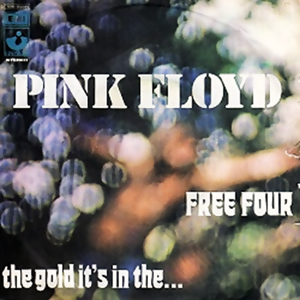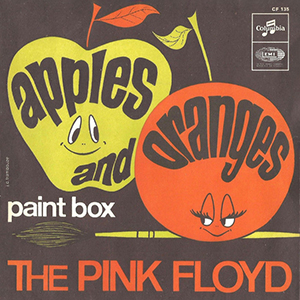
David Jon Gilmour is an English musician, singer and songwriter, who is a member of the rock band Pink Floyd. He joined as guitarist and co-lead vocalist in 1967, shortly before the departure of founding member Syd Barrett. Pink Floyd achieved international success with the concept albums The Dark Side of the Moon (1973), Wish You Were Here (1975), Animals (1977), The Wall (1979) and The Final Cut (1983). By the early 1980s, they had become one of the highest-selling and most acclaimed acts in music history; by 2012, they had sold more than 250 million records worldwide, including 75 million in the United States. Following the departure of Roger Waters in 1985, Pink Floyd continued under Gilmour's leadership and released three more studio albums.

Obscured by Clouds is the seventh studio album by the English progressive rock band Pink Floyd, released on 2 June 1972 by Harvest and Capitol Records. It serves as the soundtrack for the French film La Vallée, by Barbet Schroeder. It was recorded in two sessions in France, while Pink Floyd were in the midst of touring, and produced by the band.

The Final Cut is the twelfth studio album by the English rock band Pink Floyd, released on 21 March 1983 through Harvest and Columbia Records. It comprises unused material from the band's previous studio album, The Wall (1979), alongside new material recorded throughout 1982.

"Free Four" is a song by the English rock band Pink Floyd, written by Roger Waters and released on the band's 1972 album Obscured by Clouds.
"Cymbaline" is a Pink Floyd song from the album Soundtrack from the Film More.
"The Thin Ice" is a song by the English rock band Pink Floyd. it is the second track on their 1979 album The Wall.
"The Happiest Days of Our Lives" is a song by Pink Floyd. It appeared on The Wall album in 1979.

"Run Like Hell" is a song by English rock band Pink Floyd, written by David Gilmour and Roger Waters. It appears on the album The Wall. It was released as a single in 1980, reaching #15 in the Canadian singles chart and #18 in Sweden, but it only reached #53 in the U.S. A 12" single of "Run Like Hell," "Don't Leave Me Now" and "Another Brick in the Wall " peaked at #57 on the Disco Top 100 chart in the U.S. To date, it is the last original composition written by both Gilmour and Waters, the last of such under the Pink Floyd banner, and is the last composition ever recorded by all four members of the classic 70s-era Floyd lineup together, within their traditional instrumental roles of Waters on bass, Gilmour on guitars, Nick Mason on drums, and Richard Wright on keyboards, on the same song.
"Outside the Wall" is a song written by Roger Waters. It is the final track on the 1979 Pink Floyd album, The Wall.

"Flaming" is a song by the English rock band Pink Floyd, featured on their 1967 debut album, The Piper at the Gates of Dawn. Written and sung by Syd Barrett, the song remained in their set until late 1968; David Gilmour sang the lead vocal after Barrett's departure.
"Two Suns in the Sunset" is the closing track on Pink Floyd's 1983 concept album The Final Cut, and Roger Waters' final chronological contribution to the band, before leaving in 1985.

"The Final Cut" is the title track from Pink Floyd's 1983 album The Final Cut.

"One Slip" is a song from Pink Floyd's 1987 album A Momentary Lapse of Reason.

"Not Now John" is a song by the progressive rock band Pink Floyd, written by Roger Waters. It appears on the album The Final Cut (1983). The track is the only one on the album featuring the lead vocals of David Gilmour, found in the verses, with Roger Waters singing the refrains and interludes, and was the only single released from the album. It reached No. 30 in the UK Singles Chart.
"One of the Few" is a song by the British progressive rock band Pink Floyd. It was released as the third track on The Final Cut album in 1983. The song is 1 minute and 12 seconds long. It features a ticking clock in the background and a steady drumbeat. The melody features most of the D minor scale. The lyrics describe a war veteran's return from the battlefield to pursue teaching. The ticking clock continues to the next track, "The Hero's Return", which is sung from the veteran's perspective. This is one of the rejected songs from The Wall, and its working title was "Teach".

"Your Possible Pasts" is a song from Pink Floyd's 1983 album The Final Cut. This song was one of several to be considered for the band's "best of" album, Echoes: The Best of Pink Floyd.
"The Gunner's Dream" is a song from Pink Floyd's 1983 album The Final Cut. This song was one of several to be considered for the band's "best of" album, Echoes: The Best of Pink Floyd. The song tells the story and thoughts of an airman gunner as he falls to his death during a raid, dreaming of a safe world in the future, without war. It is one of the four songs on the video version of the album The Final Cut Video EP. In his lyrics, Waters references real-life events including the then very recent Hyde Park and Regent's Park bombings, and takes the refrain "some corner of a foreign field" from Rupert Brooke's poem The Soldier.

"Paint Box" is a song by the English rock band Pink Floyd, written and sung by keyboardist Richard Wright. It was first released in 1967 as the B-side to the single "Apples and Oranges". The song is about a man who lives in an abusive relationship and has artificial friends.
"Julia Dream" is a song by the English rock band Pink Floyd and the B-side of the single "It Would Be So Nice". The song was the first to be released by the band with lead vocals by David Gilmour.
"Seamus" is the fifth song on Pink Floyd's 1971 album Meddle. The group performs it in the style of country blues, with vocals, an acoustic slide guitar in an open D tuning, and piano. The song is named after the Border Collie who howls throughout the 2:15 piece. Group biographer Nicholas Schaffner calls the tune "dispensable"; David Gilmour added "I guess it wasn't really as funny to everyone else [as] it was to us".











